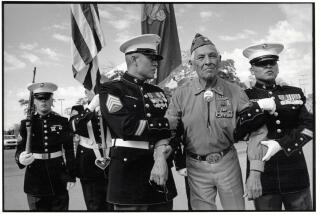THE LONG WALK by George La Fountaine (Putnam’s: $17.95; 256 pp.)
- Share via
The harrowing initial chapters of George La Fountaine’s novel take place in Vietnam, 1973, some months after the release of the “last” American POWs. Sgt. Stanley Baker, a half-Navajo U.S. medical corpsman who’s only a few days from completing his tour of duty, is busy closing down a small Medevac hospital north of Da Nang--when suddenly, on a muddy levee in the rain, three Viet Cong soldiers appear with a ghostly captive on a wire leash: a gaunt, speechless, battered human basket case, “the most miserable-looking creature” Sgt. Baker has ever seen.
Son of a poor Navajo shepherd, the young medical corpsman values “courage above all else”; the numb, half-dead prisoner’s stoic acceptance of pain reminds him of some “lone survivor of the Long Walk from the Navajos’ past,” and he soon finds himself developing a strong bond with the silent figure who’s been dropped into his care.
The prisoner, however, is not easily befriended. Informed of the man’s near-legendary defiance of his VC captors and of his multiple escapes, Baker soon learns the wary POW’s stubborn resistance to captivity has survived his release. The night he enters Baker’s Medevac compound, the prisoner tries to escape back into the jungle.
The rehabilitation of this man, his slow and painful journey back to some home ground of the soul, becomes a project that haunts Baker long after he’s “back in the world”; it also provides the main trajectory of La Fountaine’s narrative, in which this tortuous return from the abyss of the war is staged against the displaced Navajo nation’s long trek back to its homeland in 1868.
“Those that survived the Walk,” La Fountaine writes, “were a testament to Navajo courage and endurance. Any trial since had been given the nickname ‘The Long Walk.’ ” This released prisoner, we’re told, is very much on a Long Walk of his own.
His Walk takes him through a traumatic return stateside, where it’s learned that the silent, reluctant hero is not the Navy pilot his dog tag claims he is, but a Green Beret lost on a 1964 mission and long since presumed dead; lacking friends or family, he experiences the shock of homecoming with a vengeance, winding up in a VA hospital, drugged, comatose and still silent.
The relationship of Baker, the young Navajo medic, with this man radically damaged by America’s most demoralizing war, is presented by La Fountaine as an emblematic one. The novel’s real characters are cultural values: Baker’s adoption of the wary prisoner as a brother figure represents a nursing back to health of the white man’s sad, crazy, spiritually displaced society by the gentle application of a saner, prior Native American value system.
The latter is embodied in the life style of the Navajo shepherds who offer refuge to the ex-POW after Baker--now a doctor--springs him from the kennel of a VA psycho ward.
“It’s strange,” remarks Baker’s father, “bringing a prisoner of war here--to a place where our brothers think of themselves as prisoners of Washington. . . . But maybe our prison here is bigger than his.” In this “bigger prison,” the weary war-survivor pulls together the fragments of his shattered life.
This Big Sky cure is a nice twist, but almost too good to be true, and some elements of La Fountaine’s plotting, especially after we land on the reservation in the second half of the book, create strong creakings and groanings at the joints of credibility--perhaps the result of a novelist trying too hard to stick to a stenciled-in structure. “The Long Walk” stumbles in its last few steps, but that fall takes nothing away from the novel’s first hundred pages, which contain some of the more compelling prose yet written about the consequences for this country of its involvement in Vietnam.
More to Read
Sign up for our Book Club newsletter
Get the latest news, events and more from the Los Angeles Times Book Club, and help us get L.A. reading and talking.
You may occasionally receive promotional content from the Los Angeles Times.







